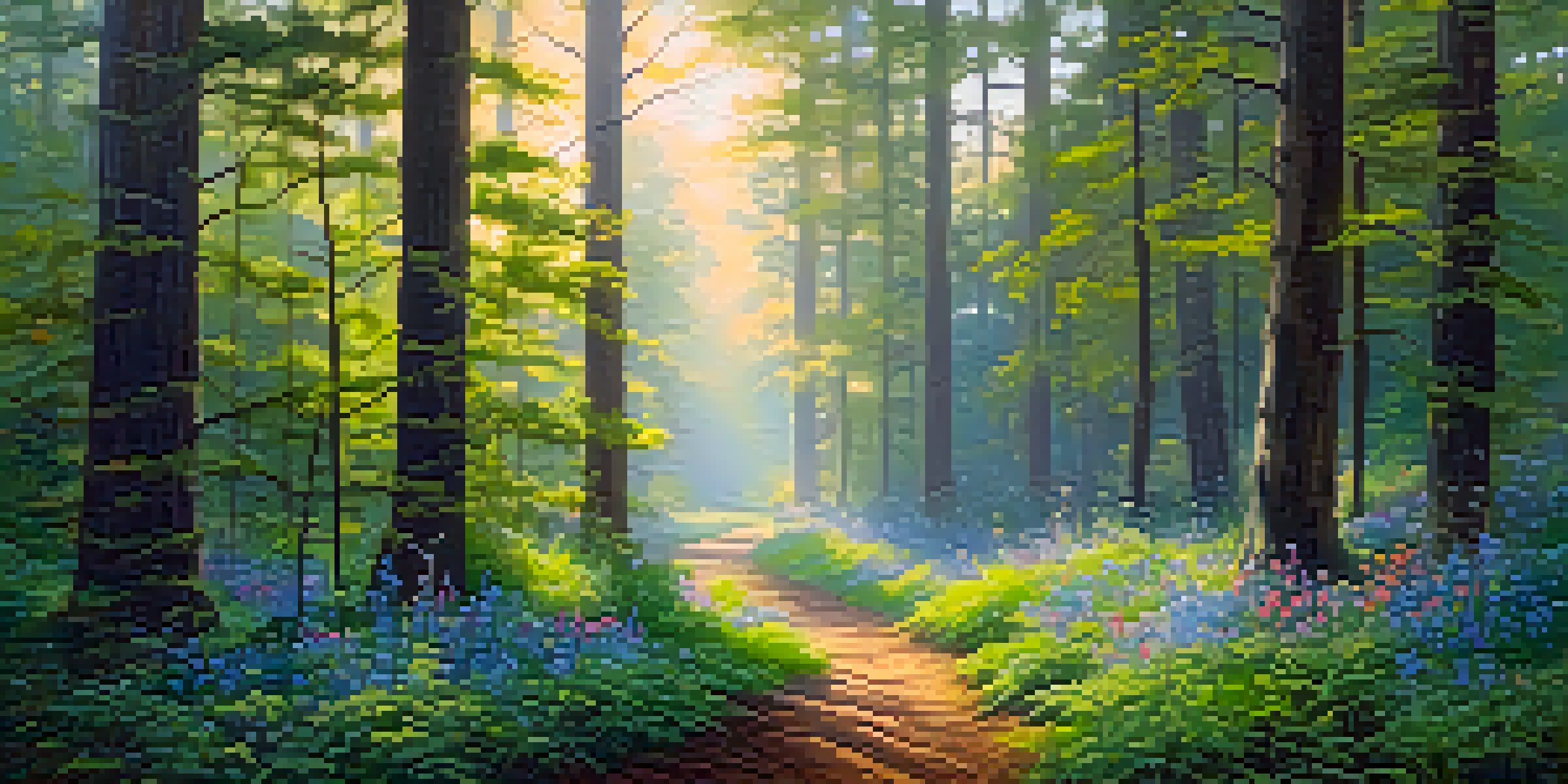The Influence of Nature on Writing: Finding Inspiration Outdoors

The Connection Between Nature and Creativity
Nature has a remarkable ability to ignite our creative sparks. Whether it's the sound of rustling leaves or the vibrant colors of a sunset, these elements can inspire new ideas and perspectives. Many writers find that stepping outside helps clear their minds and invites fresh thoughts to flow.
In every walk with nature one receives far more than he seeks.
Think about it: how often do you feel rejuvenated after a walk in the park? This simple act can shift our mental state, making it easier to tap into our creative reservoirs. It's as if nature acts as a muse, whispering stories waiting to be told.
In essence, the more we immerse ourselves in nature, the more we can enhance our creativity. This connection is not just a fleeting feeling; it’s a powerful tool that writers can harness to fuel their imagination.
Nature's Role in Shaping Narrative Themes
When we think of powerful narratives, nature often plays a pivotal role in shaping the story's themes. From the chaos of a storm to the calm of a sunrise, nature’s elements can mirror the characters' emotions and struggles. This interplay creates a more profound connection for readers.

For example, a character journeying through a dense forest may symbolize their internal struggle. The challenges they face in the wilderness can resonate with their personal battles, making the narrative more relatable. Nature becomes a character in its own right, influencing the plot's direction.
Nature Sparks Creative Inspiration
Immersing ourselves in natural settings can rejuvenate our minds and foster new ideas.
By weaving nature into our stories, we can evoke emotions and create layers of meaning. This not only enriches the narrative but also invites readers to reflect on their own relationships with the natural world.
Finding Solitude and Focus in Natural Settings
In our fast-paced world, finding solitude can be a challenge. However, nature offers the perfect escape to disconnect from distractions and hone in on our thoughts. Whether it's a quiet beach or a serene forest, these spaces help writers focus and reflect.
Nature does not hurry, yet everything is accomplished.
Imagine sitting by a tranquil lake, the only sounds being the gentle lapping of water and the distant call of birds. In such a setting, our thoughts can flow more freely, allowing for deeper contemplation and creativity. It’s a stark contrast to the noise and chaos of everyday life.
Embracing these natural retreats can lead to breakthrough moments in our writing. They provide a sanctuary where we can listen to our inner voice and cultivate our ideas without interruption.
The Power of Sensory Experiences Outdoors
Nature engages all our senses, creating a rich tapestry of experiences that can inspire writing. The smell of pine trees, the sound of waves crashing, and the sight of blooming flowers all contribute to a sensory feast. This richness can enhance our descriptive writing significantly.
For instance, when describing a scene, drawing from your sensory experiences can paint a vivid picture for readers. Instead of saying 'it was a beautiful day,' you might describe 'the warmth of the sun on your skin and the fragrance of lilacs in the air.' Such details make the writing come alive.
Nature Enhances Narrative Depth
Incorporating elements of nature into storytelling can evoke emotions and create relatable themes.
By tapping into our sensory experiences in nature, we can elevate our storytelling, making it more immersive and engaging for our audience. The world around us becomes a source of inspiration, fueling our creativity.
How Nature Reflects Personal Growth
Nature is often a mirror for our personal growth and transformation. Just as trees shed their leaves in autumn, we too go through phases of change. These parallels can provide powerful metaphors in our writing, illustrating our journeys.
Consider how a character might overcome obstacles, much like a flower breaking through concrete. This imagery not only resonates with readers but also inspires them to see their challenges from a new perspective. Nature's resilience can motivate us to reflect on our strength.
By incorporating these themes of growth and renewal from nature into our writing, we can create stories that resonate deeply with readers. It reminds us that transformation is a natural part of life, and every setback can lead to new beginnings.
Encouraging Mindfulness Through Outdoor Writing
Writing outdoors encourages mindfulness, urging us to be present in the moment. When surrounded by nature, we can become more aware of our thoughts, feelings, and surroundings. This heightened awareness can lead to more authentic and passionate writing.
Imagine taking a moment to breathe in the crisp air, feeling the ground beneath your feet, and listening to the rustle of leaves. These simple acts can ground us, allowing our writing to flow more freely and authentically. Mindfulness becomes a practice that enhances our craft.
Mindfulness Through Outdoor Writing
Writing outdoors promotes mindfulness, allowing for more authentic and passionate expression.
As we embrace mindfulness in our writing, we cultivate a deeper connection not only with our work but also with ourselves. This practice can transform our approach to storytelling, leading to more genuine and heartfelt narratives.
Building a Routine: Nature as a Writing Companion
Integrating nature into your writing routine can cultivate a sense of calm and creativity. Whether it's a morning walk or a weekend hike, establishing a connection with the outdoors can become a vital part of your writing process. This routine encourages consistency and inspiration.
Consider setting aside specific times to write outside, making it a ritual that you look forward to. Over time, these moments can become sacred, associating the beauty of nature with the act of writing. It’s a simple yet powerful way to enhance your creative flow.

By making nature your writing companion, you’re not only enriching your work but also nurturing your spirit. This connection can lead to a more fulfilling writing experience, blending creativity with the tranquility of the natural world.